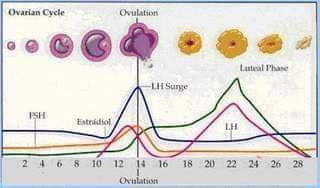Menstruation - Myths and Facts!
When ovulation doesn't occur, progesterone is not produced, however estrogen-induced endometrial accumulation continues indefinitely. Progesterone normally balances the effects of estrogen. As a result of this unopposed estrogen, shedding of the thickened endometrium is irregular, happening when it can no longer maintain itself. This pattern is known as estrogen breakthrough bleeding, which results in delayed and unusually heavy periods. A pattern more commonly experienced by peri-menopausal women is estrogen withdrawal bleeding. As estrogen levels decline in the peri-menopause, the endometrium develops inadequately. In this case, irregular shedding results in spotting between periods, or light, frequent, and/or short menstruation.
Many women experience anovulatory bleeding at one time or another during their menstruating lifetime. This condition is more common among girls during the year or two after their first period and among women nearing menopause. Anovulatory bleeding is diagnosed by a women's health care provider or gynaecologist after other causes of irregular uterine bleeding have been eliminated through tests and/or diagnostic procedures.
A variety of factors can cause changes in normal hormonal function and menstruation, including:
- Long-distance travel and changes in circadian rhythms
- Medications, such as hormone therapy and oral contraceptives
- Ovarian cysts or other hormone-secreting tumours
- Strenuous physical activity
- Significant weight loss or gain
- Extreme emotional stress
- Chronic disease, illness, infection
- Eating disorders
- Polycystic ovarian syndrome (PCOS)
- Pregnancy
Early diagnosis and treatment of anovulatory bleeding are essential. Possible complications include iron deficiency anaemia, infertility, osteoporosis, and endometrial cancer. With appropriate management, normal menstruation can often resume. Treatment generally includes hormonal regulation with birth control pills or progesterone supplementation.
If a woman has been experiencing unusual vaginal bleeding, fever, abdominal pain, dizziness, and/or fainting, it's important to make an appointment to see a women's health care provider or gynaecologist for an evaluation.
Menstruation is the periodic (usually monthly) shedding of the lining of the uterus that occurs under the influence of hormones. Hormones control ovulation (release of an egg from the ovary), the development of the endometrium (uterine lining), and menses (monthly flow). Appropriate hormones in adequate amounts and released in the proper sequence are necessary for the monthly pattern to continue. Without normal hormonal functioning, ovulation does not take place, disrupting the normal monthly pattern.
During a normal menstrual cycle, hormones from the brain stimulate the ovaries to prepare an egg and to release the hormone estrogen, which builds up the endometrium. Following ovulation, the ovary that released the egg secretes the hormone progesterone, which prepares the endometrium for conception. Progesterone secretion declines if pregnancy does not occur, and the menstrual phase of the cycle begins, with the sloughing off of the endometrium in menstrual blood. Periodic, monthly bleeding can only result following ovulation, since it is this event that promotes progesterone production and declines two weeks later, bringing on menses.
For many women' the period' simply means vaginal bleeding without regard to the pattern of bleeding. In this sense, it is possible to bleed without ovulating, but the bleeding will be irregular. This is known as dysfunctional uterine bleeding or anovulatory bleeding. Anovulatory bleeding varies inflow, duration, and schedule, and often is mistaken for a menstrual period.
Lastly, even though women can have bleeding without ovulation, they still need to use birth control if they want to be protected from pregnancy. The timing of ovulation is unpredictable, so it makes sense to be protected.



+1.svg)
